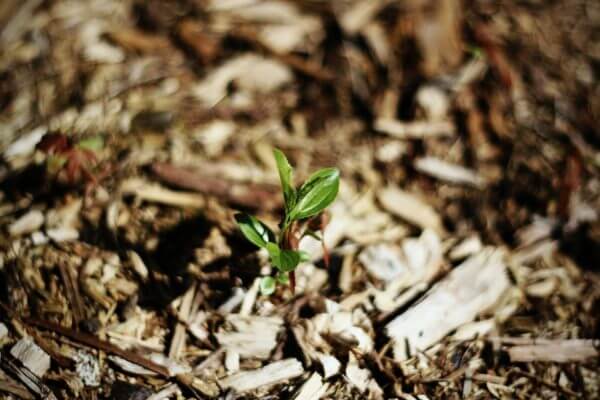Mulching is applying a layer of organic material to soil to benefit a plant. When done correctly, mulching is very beneficial for the plants when. Mulching provides a lot of nutrients for plants among other benefits., helps preserve moisture, aids in drainage, protect roots from frost, and improves the condition of the soil.

What Can You Use for Mulching
Mulching is inexpensive. You can use materials just lying around your home or yard for mulching. You can use tree bark, wood chips, pinecones, leaves, sticks, organic packing peanuts, and any other organic materials.
Benefits of Mulching
Here are some benefits of mulching:
- When quality mulches cover the soil, it prevents loss of soil moisture by reducing evaporation.
- It prevents the germination and growth of weeds.
- If you are using organic mulches (which you should), the mulch will eventually decompose and improve the fertility of the soil.
- It prevents crusting of the soil surface.
- It helps regulate soil temperature. Mulching during winter prevents frost from getting into plant roots.
- When placed at the bottom of pots, it aids in drainage.
When to Mulch
Any time is a good time to mulch. You can gain different benefits at different times of the year, but to be precise, mulching is a great assistance to your plants and soil all year round. Mulching in spring will help prevent weeds. Mulching in summer can help you cool down your soil temperature. When done in winter, it will help regulate soil temperature. Before filling up a pot with potting mix, add a layer of mulch at the bottom. It will aid in drainage and will eventually become plant food.
How to Apply Mulch
- Soil beds and borders can be fully mulched. Just make sure not to smother low growing plants.
- Organic mulch should not be more than 3 to 4 inches deep. Too much fine mulch can suffocate plant roots, resulting in yellowing of leaves and poor growth.
- It is best to apply mulch over moist soil, after removing weeds.
Possible Problems When Mulching
If laid correctly, mulch should never cause any problems. But there are cases when mulch can have direct contact with stems of trees or shrubs and may cause the stem to soften. This can make the plant vulnerable to disease.
Artillery Fungus can also be a problem. It can produce structures that resemble tiny cream or orange-brown cups that hold a spore mass resembling a tiny black egg. Make sure to watch out for this type of fungus. Though artillery fungus isn’t known to kill plants and are not harmful to humans, they can be quite unsightly.
Slime mold can also appear as an unsightly bright yellow slimy mass. They are normally harmless but not pleasant for the eyes.
To wrap this up, mulching doesn't require much of a budget and comes with a lot of benefits. It’s not a lot of work but even if it is, that's what gardening is all about.
How often do you mulch your plants?
Check out the original post here:
https://iotagarden.com.au/what-is-mulching-and-why-should-you-do-it/
Comments
Post a Comment